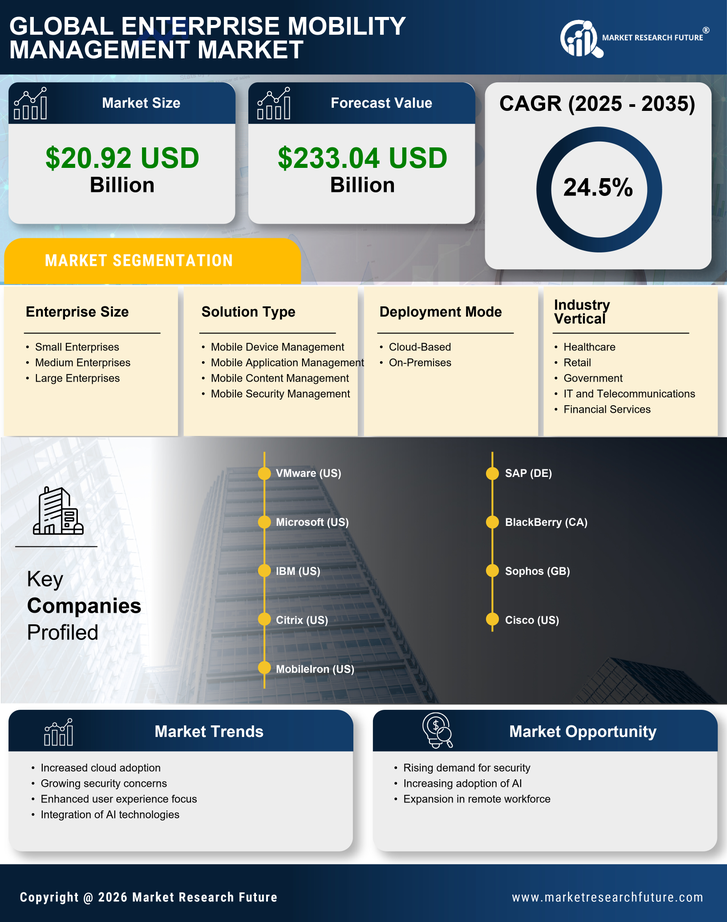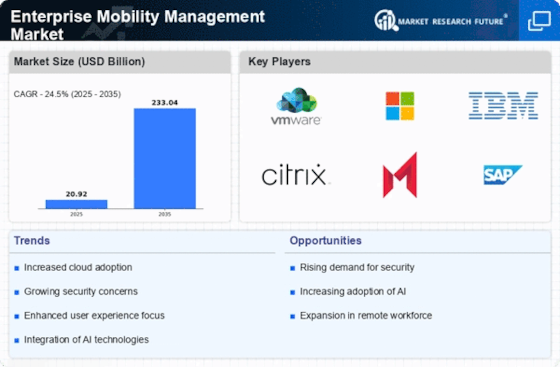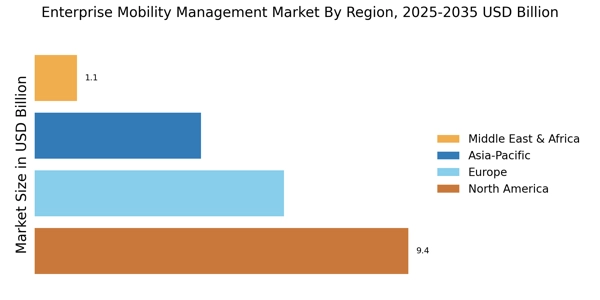Advancements in Mobile Technology
The Enterprise Mobility Management Market is significantly impacted by advancements in mobile technology. The proliferation of smartphones, tablets, and other mobile devices has transformed the way businesses operate. Enhanced mobile capabilities, such as improved processing power and connectivity, enable organizations to deploy sophisticated Enterprise Mobility Management Market solutions. Market data indicates that the number of mobile devices in use is expected to exceed 5 billion by 2025, creating vast opportunities for mobility management providers. As companies seek to leverage these advancements, the demand for comprehensive Enterprise Mobility Management Market solutions that can integrate with various mobile platforms is likely to increase. This trend suggests a dynamic evolution within the Enterprise Mobility Management Market, driven by technological innovation.
Emphasis on Enhanced User Experience
The Enterprise Mobility Management Market is increasingly focusing on enhancing user experience as a key driver of growth. Organizations recognize that a positive user experience is essential for employee satisfaction and productivity. As a result, there is a growing demand for Enterprise Mobility Management Market solutions that prioritize usability and accessibility. Recent surveys indicate that companies that invest in user-friendly mobility management tools report higher employee engagement and lower turnover rates. This emphasis on user experience is likely to shape the development of future Enterprise Mobility Management Market solutions, as vendors strive to create intuitive interfaces and seamless integration with existing workflows. Consequently, the focus on user experience may serve as a catalyst for innovation within the Enterprise Mobility Management Market.
Rising Demand for Remote Work Solutions
The Enterprise Mobility Management Market is experiencing a notable surge in demand for remote work solutions. As organizations increasingly adopt flexible work arrangements, the need for effective mobility management tools becomes paramount. According to recent data, the market for remote work solutions is projected to grow at a compound annual growth rate of approximately 15% over the next five years. This growth is driven by the necessity for secure access to corporate resources from various devices and locations. Consequently, businesses are investing in Enterprise Mobility Management Market solutions to ensure seamless connectivity and data protection. The emphasis on remote work is likely to continue shaping the landscape of the Enterprise Mobility Management Market, as companies seek to enhance productivity while maintaining security protocols.
Increased Regulatory Compliance Requirements
The Enterprise Mobility Management Market is significantly influenced by the rising regulatory compliance requirements across various sectors. Organizations are compelled to adhere to stringent data protection regulations, such as the General Data Protection Regulation (GDPR) and the Health Insurance Portability and Accountability Act (HIPAA). These regulations necessitate the implementation of robust mobility management solutions to safeguard sensitive information. As a result, the demand for Enterprise Mobility Management Market tools that facilitate compliance is expected to rise. Market analysts indicate that companies investing in compliance-focused mobility solutions may experience a competitive advantage, as they can mitigate risks associated with data breaches and non-compliance penalties. This trend underscores the critical role of Enterprise Mobility Management Market in navigating the complex regulatory landscape.
Growing Adoption of Bring Your Own Device (BYOD) Policies
The Enterprise Mobility Management Market is witnessing a growing adoption of Bring Your Own Device (BYOD) policies among organizations. This trend allows employees to use their personal devices for work purposes, thereby enhancing flexibility and productivity. However, it also raises concerns regarding data security and management. As a response, businesses are increasingly turning to Enterprise Mobility Management Market solutions to establish secure frameworks for BYOD. Recent studies suggest that nearly 70% of organizations have implemented or are planning to implement BYOD policies, highlighting the need for effective management tools. The rise of BYOD is likely to drive innovation within the Enterprise Mobility Management Market, as vendors develop solutions that address security, compliance, and user experience.


















